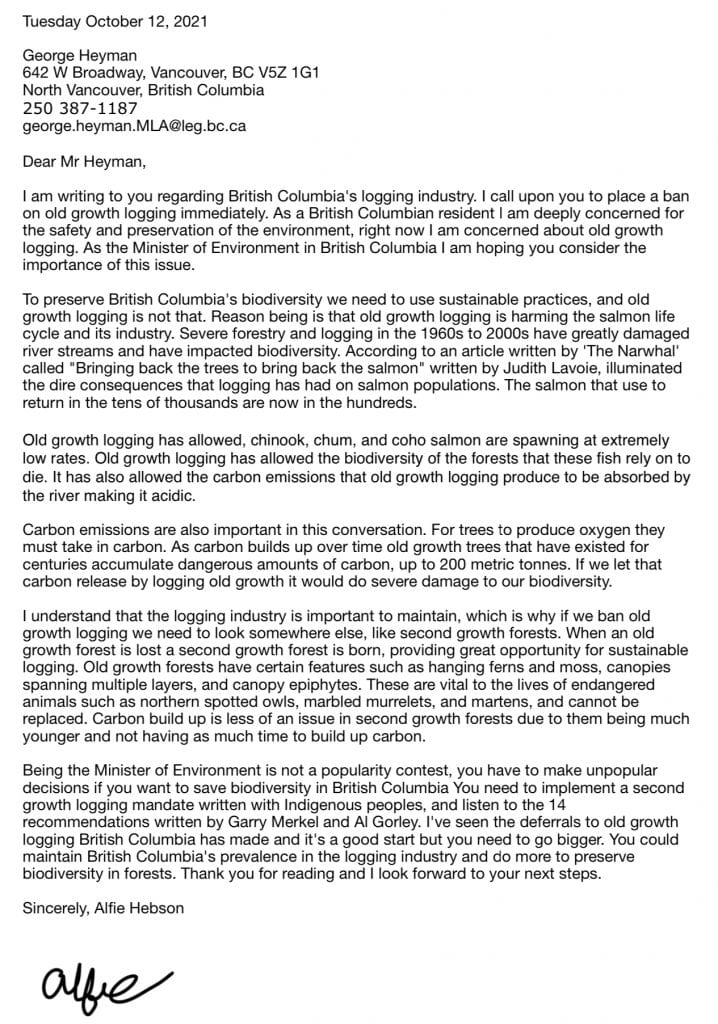Ive just completed my first Humanities project of Grade 9, and I got to write to Minister of Environment in BC. This project “People and the Environment” was by far the most open ended project we’ve done, having to write a letter to a provincial official about an environmental issue we are passionate about.
We started of this project with a writing assignment over the weekend based on 1 question, ” In your opinion, are more people today protectors of nature or destroyers of nature? “. I wrote a few paragraphs but this was my summary:
“To summarize, there are more people hurting the environment rather than protecting it, partially because not everyone can live an eco-friendly life. Combine that with the fact that the government, the most important people in Canada are not helping definitely furthers me in my decision.”
Over the course of said weekend we were supposed to come up with a topic that we wanted to write our letter about. My original topic was “Old growth logging in British Columbia”. We were put into table groups with people who have similar topics (forestry and logging). I chose this topic because it is something i’m hearing a lot more of recently and wanted to know more.
We then had our first milestone, the Letter Plan Conference. This is where I realized I started off behind in this project not having anywhere to go but thankfully the conference caught me up to speed on what to focus on for this project.
Now here we are, the first draft if the letter. There were a couple things I didnt know about writing a paper letter, i.e. how to cite sources, how to structure a letter and to write an actual solution to the problem, this was draft 1:

We then got to talk to Megan Curren a North Vancouver District Councillor, and Dennis Thomas an Elected Councillor from the Tsleil-Waututh Nation. Many wise words about how big or national change is started from little or local changes. Because we got to hear their opinions and experiences knew some points I needed to add to my letter. I then wrote draft 2:

There are a lot of skills that go into writing a letter, phrasing, persuasion, structure, formality, and focus of topic. We learnt to develop these skills using common-lit, a website full of stories (fiction and non-fiction). An example would be a story called “Lee Sherman and the Louisiana Bayou” a story about a man named Lee Sherman works for a company called PPG that works with and dumps a lot of toxic chemicals. The companies work ethics have killed many workers, their dumping into public rivers ends up polluting local river streams damaging the marine life and the fishing industry of the town. Lee is told to dump the waste in secret as the company knows it’s controversial, however Lee sees the effects of his actions and foes to the town hall and reveals it was him and the PPG who harmed the river life. Common-lit was responsible for 2 of our milestones, 1 for reading and analyzing the stories, the other for a 3 paragraph timed write. These were some common-lit assignments:

We learnt to make claims with evidence with quotes and identify mood changes throughout a story. Lee Sherman and the Louisiana Bayou is very similar to my letter in terms of theme that for the 3 paragraph timed write , I used it as a comparison:

As we neared the final stages of our letter we got review from the senior grades on our letter. I was given very helpful critique, making me feel a lot more confident than an hour prior. We hit the point in project where its just a bunch of revisions until the letter is perfect, word choices, not indenting paragraphs (apparently you don’t indent paragraphs if its for a letter). Thankfully it paid off as I handed in my final copy not late.
With the writing done, here is my final copy:

As a finale we walked down to the cove to mail our letters, it was raining and I wasn’t wearing my hood I did not just take a shower

This was the project that made me go “hey I’m in highschool now” because of the freedom we got to have with it. I wonder if my letter will get a response, or anyones for that matter. So now its time to answer the driving question:
“How do people and the environment affect each other?”
To affect something is to interact with it. The fact we exist at the same time at the same place affects us. When we interact with a forest by logging it, we have affected the forests habitat and ecosystem, when we grow trees we affect the habitat by adding to it. The environment affects us by having created an ecosystem fit for our survival. People and the environment affect each other by living together.
